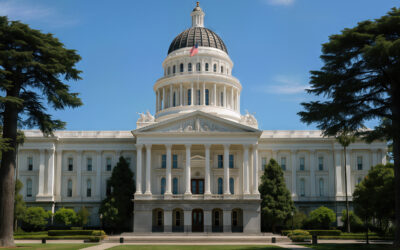The major highlights for K-14 public education include a proposal to provide $3 billion to reduce long-term CalSTRS liabilities for school employers. This is a one-time non-Proposition 98 payment that will directly benefit schools without reducing Prop 98 operational funds. Total Prop 98 funding for 2019-20 is $80.7 billion which will provide a COLA for the LCFF and other categorical programs and a significant new investment for special education. There are, of course, a number of early education proposals as well.
The entire budget proposal is available here. We will provide an analysis of the budget proposal later today.
Governor Newsom’s Press Release
Governor Newsom Proposes 2019-20 “California For All” State Budget
Governor Gavin Newsom submitted his 2019-20 “California for All” budget proposal to the Legislature today – a fiscal blueprint that builds a strong financial foundation by investing an unprecedented $13.6 billion in budget resiliency and paying down unfunded pension liabilities.
“During my inaugural speech, I described the California Dream as a house we are building together,” said Governor Newsom. “That wasn’t just a speech device – it’s exactly what we are proposing today. To make the California Dream available to all, our state must be fiscally sound. This Budget lays a strong financial foundation for our state by eliminating debts, expanding the rainy-day fund and paying down our unfunded liabilities.”
Building the Foundation for the California Dream
Given federal political uncertainty, the risks to the current economic forecast, and the need for a solid fiscal foundation, the Budget allocates $13.6 billion to building budgetary resiliency and paying down the state’s unfunded pension liabilities. This includes:
- $4 billion investment that eliminates all outstanding budgetary debt as well as deferrals
- $4.8 billion to build reserves, bringing the state’s Rainy Day Fund to more than $15 billion this year (the largest amount ever) and nearly $20 billion over four years
- $4.8 billion to pay down unfunded retirement liabilities
The Budget’s remaining spending prudently charts the path toward building a long-term fiscal foundation. Over 86 percent of the new spending contained in the Budget is one-time, and in each of the out-years the Budget has positive operating balance. The Budget also more than quadruples the size of the state’s Safety Net Reserve, strengthening programs that provide the first-line of defense for families during an economic downturn.
Confronting the Cost Crisis
While fortifying the state’s fiscal foundations, the Budget sets forth a series of proposals that help families confront the cost crisis. The Budget funds a comprehensive early childhood plan, more affordable paths for higher education, brings the state closer toward health care for all, and takes meaningful steps to addressing the housing crisis.
The Budget creates a new “Working Families Tax Credit” by more than doubling the size of the state’s Earned Income Tax Credit to $1 billion, supporting low-income families with young children by providing a $500 credit for families covered by the credit with children under the age of six. The credit will also be expanded to reach full-time workers earning $15 per hour—reaching 400,000 additional families. This expanded credit will be funded as part of a tax conformity package.
To improve affordability and access to health care, the Budget addresses the rising cost of prescription drugs, makes critical investments to uphold and expand the Affordable Care Act by increasing subsidies to ensure that more low- and middle-class Californians can afford health coverage through Covered California, and makes progress in providing universal coverage by expanding Medi-Cal to approximately 138,000 young adults age 19 through 25 regardless of immigration status.
To address California’s housing crisis, the Budget includes $1.3 billion General Fund one-time and a new approach to spur housing development to address the state’s affordability crisis and promote economic growth. The Budget also expands state tax credits to further develop both low- and moderate-income housing, and proposes new innovative housing on excess state property.
The Budget includes proposals to directly address child poverty and support families in breaking the cycle of poverty through work and education, including a grant increase for the lowest income families served by the CalWORKs program to 50 percent of the Federal Poverty level. The Budget also proposes a supplemental Cal Grant award of up to $6,000 for student-parents with dependent children attending California’s public colleges and an increased number of competitive Cal Grant awards to improve access to higher education.
Focus on Early Childhood
The Budget includes funding for universal preschool for all income-eligible four-year-old children in the state, phased in over a three-year period. This funding will allow state preschool providers to offer full-day/full-year care to better accommodate working parents. The Budget proposes the development of a plan to achieve universal preschool for all children in California, including new revenue options to support increased enrollment. The Budget includes $500 million one-time General Fund to build child care infrastructure, including investing in the education of the child care workforce.
To promote affordability and family bonding, the Administration is committed to expanding the Paid Family Leave program with the goal of ensuring that all newborns and newly adopted babies can be cared for by a parent or a close family member for the first six months. The Budget proposes to adjust the reserve requirement for the fund that supports the Paid Family Leave program. This change will enable the state to make a down payment in expanding Paid Family Leave in the upcoming budget year while maintaining an adequate reserve. During the year, the Administration will convene a task force to consider different options to increase participation in the program and to phase in this program expansion.
Largest K-12 Education Per-Pupil Expenditure in History
The funding guarantee for K-12 schools and community colleges in 2019-20 is $80.7 billion — a new all-time high with per-pupil expenditures now nearly $5,000 higher than just 7 years ago. The Budget also funds critical work to build a longitudinal data system to better track student outcomes and increase the alignment of our educational system to the state’s workforce needs.
The Budget also includes $750 million one-time General Fund to address barriers to full-day kindergarten. About one quarter of students enrolled in kindergarten do not have access to a full-day kindergarten program. This investment will put California on a path for all kindergartners to attend full-day kindergarten.
To address the rising costs of CalSTRS pensions and provide immediate relief to districts, the Budget proposes a $3 billion one-time non-Proposition 98 General Fund payment to CalSTRS on behalf of schools (the employers). Overall, this payment is expected to provide immediate relief to school districts and will reduce the out-year contribution rate by half a percentage point.
The Budget reflects $576 million in Proposition 98 General Fund to support expanded special education services in school districts with a high concentration of special education students.
Free Two Years Community College & Long-Term Investments in Higher Education
The Budget includes $1.4 billion ($942 million ongoing) for higher education to support increased enrollment, improved time to degree and a tuition freeze. Segments serving a higher number of students receive a greater amount of the increased resources. The Budget proposes funding for two free years of community college tuition for first-time, full-time students.
- University of California—$240 million ongoing General Fund for operational costs; student success, student hunger and housing initiatives; ongoing support for graduate medical education; and mental health resources. The Budget also includes $138 million one-time General Fund for deferred maintenance.
- California State University—$300 million ongoing General Fund for operational costs, increased enrollment, and for continued progress toward the equity goals of the Graduation Initiative 2025. The Budget also includes $247 million in one-time General Fund for the expansion of on-campus child care facilities serving students and deferred maintenance, and $15 million in one-time General Fund for student hunger and housing initiatives.
- Community Colleges—$402 million ongoing Proposition 98 General Fund, including a 3.46-percent COLA, enrollment growth, legal services for undocumented students and families, and providing a second year of free tuition.
Invests in Emergency Readiness, Response and Recovery
The Budget proposes to continue to support local areas devastated by the 2018 wildfires by backfilling wildfire-related property tax losses and waiving the local share of cost for debris removal. Funding for impacted schools is also backfilled.
The Budget includes $200 million General Fund to augment CAL FIRE’s firefighting capabilities, adding 13 additional year-round engines, replacing Vietnam War-era helicopters, deploying new large air tankers, and investing in technology and data analytics that will support CAL FIRE’s incident command in developing more effective initial fire suppression strategies. The Budget also continues $25 million General Fund ongoing for pre-positioning local government fire engines to support the state’s critical mutual aid system.
The Budget also includes $60 million General Fund one-time to jump-start upgrades to the 911 system, including an overhaul to the existing fee that will sustainably fund a modern, reliable system. The Budget includes $16.3 million General Fund to finish the build-out of the California Earthquake Early Warning System. To help local governments and individuals be more prepared for emergencies, the Budget proposes $50 million General Fund one-time for local grants and to immediately begin a comprehensive, statewide education campaign on disaster preparedness and safety.
The Budget also provides a sizable investment in forest management—$214 million—to increase fire prevention and complete additional fuel reduction projects, including increased prescribed fire crews.
Promotes Justice and Dignity For All Our Communities
Homelessness pervades both urban and rural communities across the state and puts stress on local resources, from emergency rooms and mental health and social services programs to jails. The Budget includes $500 million one-time General Fund to encourage local governments to build emergency shelters and navigation centers, and $25 million General Fund ongoing to assist homeless disabled individuals in applying for disability benefits.
The Budget focuses on finding ways to improve brain health and improve care by investing in mental health workforce training, early psychosis research and treatment, and a Whole Person Care pilot program to coordinate health, behavioral health and social services, including supportive housing for people with severe mental illness.
The Budget allocates $25 million General Fund (including $5 million to be made available in the current year) for an immigration rapid response program to assist qualified community-based organizations and non-profit entities in providing services to address this crisis. The Budget also includes $75 million General Fund ongoing for immigration-related services, including assisting applicants seeking Deferred Action for Childhood Arrivals; naturalization; and other immigration remedies.




0 Comments